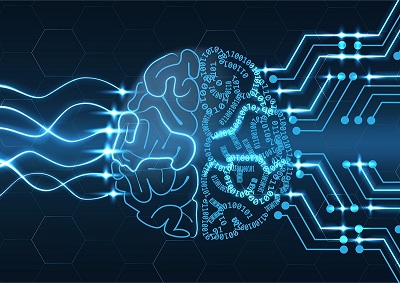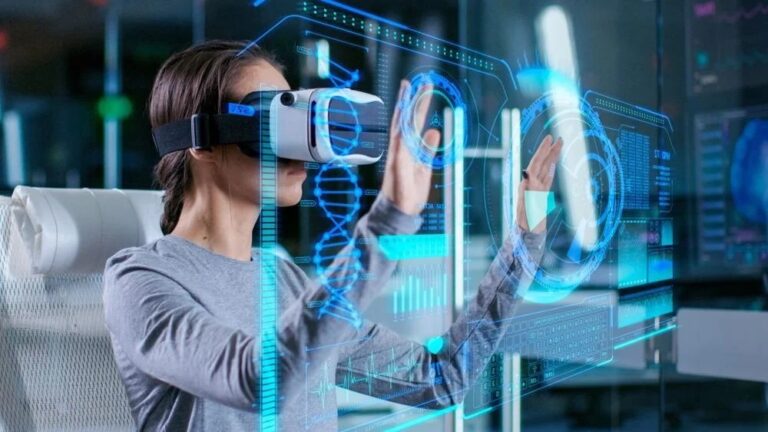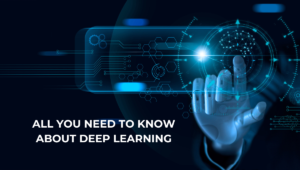Deep learning is a cornerstone of artificial intelligence (AI), and its applications are continually expanding as research progresses and new technologies emerge. Here’s an exploration of additional areas where deep learning is having a significant impact and shaping future advancements.
Deep Learning in Mental Health and Well-being
- Mental Health Diagnostics:
- Predictive Analysis: Deep learning models analyze patterns in speech, text, and behavior to predict mental health issues such as depression, anxiety, and bipolar disorder. Early detection allows for timely intervention and personalized treatment plans.
- Sentiment Analysis: AI-powered tools analyze social media and communication data to assess emotional states and detect potential mental health concerns, providing insights for mental health professionals and support services.
- Therapeutic Interventions:
- AI-Powered Therapy: Virtual therapy applications use deep learning to provide cognitive behavioral therapy (CBT) and other therapeutic interventions, offering accessible support for individuals seeking mental health assistance.
- Emotion Recognition: AI systems recognize and interpret emotional expressions in facial images and voice recordings, enhancing the effectiveness of therapeutic interactions and improving emotional support.
Deep Learning in Manufacturing and Industry
- Predictive Maintenance:
- Equipment Health Monitoring: Deep learning models analyze data from sensors and machinery to predict potential failures and schedule maintenance activities proactively, reducing downtime and extending equipment lifespan.
- Anomaly Detection: AI detects unusual patterns in manufacturing processes, identifying issues such as equipment malfunctions or production defects before they escalate into major problems.
- Process Optimization:
- Production Efficiency: Deep learning algorithms optimize production processes by analyzing real-time data and making adjustments to improve efficiency, reduce waste, and enhance product quality.
- Supply Chain Management: AI enhances supply chain operations by predicting demand, optimizing inventory levels, and streamlining logistics, leading to more efficient and cost-effective supply chain management.
Deep Learning in Augmented Reality (AR) and Virtual Reality (VR)
- AR Experiences:
- Object Recognition: Deep learning models enhance AR applications by recognizing and tracking objects in real time, enabling interactive and immersive experiences for gaming, education, and retail.
- Enhanced Visualization: AI improves the accuracy and realism of AR visualizations by analyzing spatial data and generating high-quality graphical overlays that seamlessly integrate with the physical environment.
- VR Applications:
- Content Generation: Deep learning aids in creating realistic and dynamic VR environments by generating lifelike textures, animations, and interactions, enhancing the overall user experience.
- User Interaction: AI-powered systems analyze user actions and preferences in VR to tailor experiences and adapt virtual environments in real-time, providing personalized and engaging content.
Deep Learning in Space Exploration
- Astronomical Data Analysis:
- Galaxy Classification: Deep learning models analyze astronomical images to classify galaxies, detect celestial phenomena, and identify new objects in the universe, advancing our understanding of cosmic structures.
- Exoplanet Detection: AI enhances the detection of exoplanets by analyzing light curves from telescopes and identifying subtle variations that indicate the presence of planets orbiting distant stars.
- Mission Planning:
- Trajectory Optimization: Deep learning models optimize spacecraft trajectories and mission planning by analyzing data from previous missions, predicting space conditions, and simulating various scenarios.
- Autonomous Navigation: AI enables autonomous navigation of spacecraft and rovers by processing sensor data and making real-time decisions for exploration and data collection in remote and hazardous environments.
Deep Learning in Personalized Recommendations
- E-Commerce:
- Product Recommendations: Deep learning models analyze user behavior, preferences, and purchase history to provide personalized product recommendations, enhancing the shopping experience and increasing sales.
- Dynamic Pricing: AI algorithms adjust pricing based on demand, inventory levels, and market conditions, optimizing revenue and providing competitive pricing strategies.
- Content Streaming:
- Media Recommendations: Deep learning enhances content recommendation systems for streaming platforms by analyzing viewing habits, genres, and ratings to suggest personalized movies, TV shows, and music.
- Content Curation: AI curates personalized playlists and content collections based on user preferences and behavior, improving engagement and satisfaction with streaming services.
Deep Learning in Legal Tech
- Case Law Analysis:
- Legal Research: Deep learning models analyze vast amounts of legal documents, case law, and statutes to provide insights and support legal research, helping lawyers and legal professionals find relevant information quickly.
- Predictive Legal Analytics: AI predicts case outcomes and legal trends by analyzing historical case data and judicial decisions, assisting in case strategy and decision-making.
- Contract Management:
- Automated Contract Review: AI systems review and analyze contracts to identify key clauses, potential risks, and compliance issues, streamlining contract management and reducing manual effort.
- Contract Drafting: Deep learning models assist in drafting legal documents by generating boilerplate text, suggesting clauses, and ensuring consistency with legal standards and requirements.
Deep Learning in Personal Finance and Investment
- Financial Planning:
- Expense Tracking: AI-powered applications analyze spending patterns and financial data to provide personalized budgeting advice and track expenses, helping individuals manage their finances more effectively.
- Investment Recommendations: Deep learning models analyze market trends, financial data, and investment portfolios to offer personalized investment advice and strategies, optimizing financial growth.
- Fraud Detection:
- Transaction Monitoring: AI detects fraudulent transactions by analyzing patterns and anomalies in financial data, reducing the risk of fraud and enhancing security in banking and financial services.
- Risk Assessment: Deep learning models assess financial risks by analyzing historical data, market conditions, and economic indicators, supporting more informed decision-making in investment and lending.
Future Directions in Deep Learning
- Explainable AI (XAI):
- Transparency: Developing techniques for making deep learning models more interpretable and transparent, helping users understand how decisions are made and increasing trust in AI systems.
- Accountability: Ensuring that deep learning models adhere to ethical standards and are accountable for their decisions, particularly in sensitive applications such as healthcare and criminal justice.
- Ethical and Responsible AI:
- Bias Mitigation: Addressing and mitigating biases in deep learning models to ensure fair and equitable outcomes across diverse populations and applications.
- Privacy Protection: Implementing measures to protect user privacy and secure data in deep learning applications, balancing innovation with ethical considerations.
- Continual Learning:
- Adaptability: Developing deep learning models that can continuously learn and adapt from new data without requiring retraining from scratch, improving their ability to handle dynamic environments and evolving challenges.
- Lifelong Learning: Enabling AI systems to accumulate knowledge over time and apply it to new tasks and scenarios, enhancing their versatility and long-term utility.
Conclusion
Deep learning is a transformative technology with far-reaching implications across various domains, from mental health and manufacturing to space exploration and personal finance. Its ability to analyze complex data, recognize patterns, and make predictions is driving innovation and creating new opportunities for improvement and efficiency. As deep learning continues to evolve, addressing ethical considerations, enhancing transparency, and developing adaptive learning capabilities will be essential in maximizing its benefits and ensuring a positive impact on society. The future of deep learning promises exciting advancements and opportunities, shaping a more intelligent and interconnected world.





+ There are no comments
Add yours